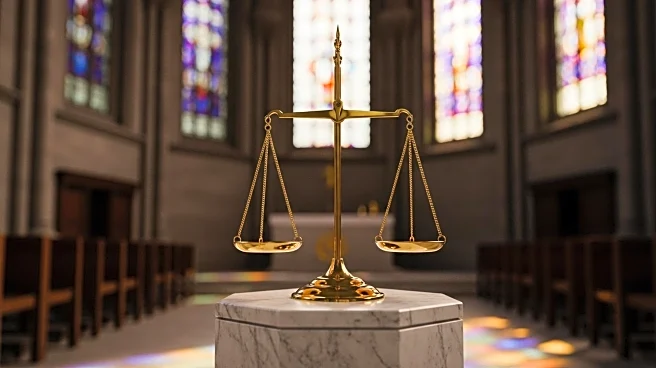What's Happening?
A man was arrested and charged with possession of explosives outside a Washington, DC church where an annual Mass marking the start of the Supreme Court term was scheduled. The suspect, Louis Geri, a 41-year-old from Vineland, New Jersey, faces charges including unlawful entry and possession of a Molotov cocktail. The event, known as the Red Mass, is held to invoke blessings on those responsible for justice administration. Although no Supreme Court justices attended, the Mass proceeded with Cardinal Robert McElroy calling for hope and a reduction in confrontational political rhetoric. The FBI stated there is no ongoing threat, and the investigation continues.
Why It's Important?
The arrest highlights ongoing security concerns surrounding high-profile events in Washington, DC, especially those involving judicial and governmental institutions. The incident underscores the need for heightened vigilance and security measures at public gatherings, particularly in politically charged environments. The call for reducing confrontational rhetoric by Cardinal McElroy reflects broader societal concerns about political violence and the erosion of trust in institutions. This event may prompt discussions on balancing security with civil liberties and the role of political discourse in fostering or mitigating violence.
What's Next?
The investigation into the incident is ongoing, with DC police collaborating with federal agencies such as the FBI and the Bureau of Alcohol, Tobacco, Firearms and Explosives. The suspect's legal proceedings will likely unfold in the coming weeks, potentially influencing security protocols at similar events. The broader implications may include increased security measures at public gatherings and discussions on political rhetoric's impact on societal violence. Stakeholders, including law enforcement and political leaders, may need to address these issues to prevent future incidents.
Beyond the Headlines
The incident raises questions about the balance between security and civil liberties, particularly in the context of public events. It also highlights the potential influence of political rhetoric on societal violence, prompting discussions on ethical communication in political discourse. The role of religious institutions in advocating for peace and justice may gain attention, as they navigate their influence in politically charged environments.









